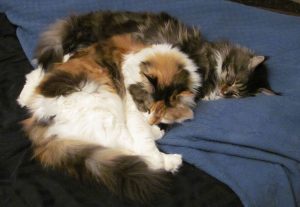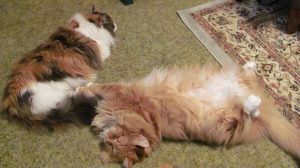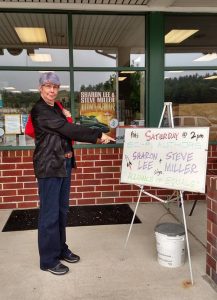This is the book about the haunted carousel. Except the carousel isn’t exactly haunted, and, though I adore carousels, especially old wooden carousels, what I really wanted to write about was a rock.
A rock and the town of Old Orchard Beach, Maine. That’s where the rock is — Googin Rock (or Googins Rock, according to some), a genuine, actual, historic rock* — Old Orchard Beach.
I adore both town and rock, though I’ll allow both to be an acquired taste, and I said for, oh, five years, maybe, that one day, I’d write about about both.
In 2007, someday arrived. I wrote the book; sent it to our agent, who sent it ’round, and it was roundly rejected until, in 2009, it found a home with Baen, and was published right around Halloween, 2010.
If you like this taste of the Maine coast, you can continue the story in ebook format, from Baen ebooks and the Usual Suspects. Carousel Tides is also available in trade paper — from the Usual Suspects — and as an audiobook, from Audible.
Full disclosure: Carousel Tides is the first book in a trilogy. Carousel Sun follows and the story concludes in Carousel Seas.
Enjoy!
___________
*5. Oct. 1675 – “Battle of Googins Rocks” Capt. Wincoll of Kittery and 11 militia men marching on the seashore to aid settlers at Pine Point are attacked by 150 Saco Indians. By hiding behind the rocks successfully drive the Indians off without the loss of a single man, even though the tide is rising. (More info here)
Excerpt from Carousel Tides, © Sharon Lee 2010
ONE
Tuesday, April 18
High Tide 2:29 a.m.
Sunrise 5:54 a.m. EDT
I almost missed the left onto Route 5, which would’ve been embarrassing as hell. Luckily, I recognized the intersection before I was through it, snapping dry-mouthed out of a quarter-doze. Luckily, the Subaru answered quick to the wheel.
Luckily, there wasn’t anybody else fool enough to be driving this particular stretch of Maine highway at this particular ungodly hour of the morning-or-night. If there had, I’d’ve been toast.
Route 5 twisted, snakelike, between parallel rows of dark storefronts and shuttered motels. I pushed myself up straighter in the seat, biting my lip when the pain knifed through my chest, and tried to stay focused on the matter at hand. Not long now. Not long.
Going home, after all this time.
No matter how many words they use to say it, people only ever leave home for two reasons. Money, that’s one. Love—that’s the other.
The reasons people come home again . . . it could be there are more than two. Me, I was worried about my grandmother. Worried enough to risk a homecoming. Trust me—that’s some kind of worried.
Mind you, the crisis or calumny that Bonny Pepperidge—that would be Gran—couldn’t settle with her off hand while cooking breakfast wasn’t something that was likely to roll over and play dead for the likes of me. Still, there was the bothersome fact that the phone had rung empty the last six times I’d called—and it was just like Gran not to bother with an answering machine or to pick herself up a cell—and the downright terrifying reality of the foreclosure notice from Fun Country management.
Perfectly reasonable for Fun Country to contact me; my name’s right there on the lease as co-owner. But I’m only an Archer—a half-Pepperidge, and not the best half, either. It’s the Pepperidges who’ve owned and operated the merry-go-round at Archers Beach since right around the dawn of civilization, Maine time; and Gran who’s had the care and keeping of the thing since well before I’d been born. The size and shape of the disaster she’d allow to threaten the carousel was—almost unimaginable.
Unfortunately, I’ve got a vivid imagination; and Gran’s my last family, so far as I know. Given the combination of circumstances, I could no more have stayed away than flown to the moon.
Not to say that Gran didn’t have a lot of friends in town—as old or older than she was, some of whom didn’t look kindly on me. And of course, there was the family lawyer. But Henry’d been out of town when I called, according to the message on his answering machine, due back some days after Fun Country wanted their money.
Which is why I was here, driving uncertainly down Maine Route 5 at oh-my-God-o’clock in the morning, toward the home I’d forsaken, and trying not to think of what was likely to be waiting for me there.
The headlights picked out a deserted parking lot on the right. I pulled in next to the boarded up ice cream stand, “For Sale” sign hanging at a crazy angle from the storm shutters, slid the car into park, and fingered my cell phone free of its pocket on the outside of my backpack.
I hit speed dial and held the unit to my ear, listening to my grandmother’s phone ringing, ringing, ringing on the other end.
Sighing, I thumbed “end” and sat holding the phone in my hand, staring out into the dark. No doubt about it, I was going to have to go in—back to Archers Beach, which I hadn’t left on the best of terms. That would teach me to burn my bridges.
Or not.
I slid the phone back into its pocket, ratcheted the stick down to drive and pulled back onto 5. Soonest begun, soonest done, as the saying goes. And the devil take the hindermost.
Mist began to creep across the road as I went on. I kept my foot on the gas, and I won’t say I wasn’t holding my breath when the Subaru crossed the town line, which was a waste of perfectly good anxiety—nothing out of the ordinary happened, unless you count an increase of mist.
Breathing carefully, I turned off Route 5 and headed down into town.
The street lamps were out on Archer Avenue, and the Subaru’s headlights illuminated swirls of sea mist pirouetting before boarded-up storefronts. At the bottom of the long hill was the Atlantic Ocean, hidden by a full-fledged fog.
I rolled the window down, shivering in the sudden cold breeze, and took a deep breath of salt air. My eyes watered—which was the salt, or maybe the breeze—and slammed on the brakes as a dark form loped across the street directly in front—but no. It was only the mist, playing games.
I took my foot off the brake and let the car drift.
At the bottom of the hill, where Archer Avenue crosses Grand, I tapped the brakes again. It was five-ten by the clock on the Subaru’s dash; twenty minutes shy of Gran’s usual rising time, though I told myself I no longer expected to find her at home. That last phone call, made just outside the town line, had been pretty definitive. Even Gran isn’t stubborn enough to ignore her phone ringing at four-thirty in the morning.
I should, I thought, go straight on to the house, but habit decided me otherwise. Habit and the fact that I could hear Gran’s voice just as plain as if she sat in the passenger’s seat beside me—“Did you pay your respects to the sea?”
The fog played its game of hide and seek as I felt my way ’round Fountain Circle and pulled the Subaru head first into the center of the five municipal parking spots that face the ocean across a wide stretch of fine, pale sand. In Season there would be signs posted, warning drivers of a ten minute limit on parking, and a strictly enforced tow away policy.
In April, the signs were still in the Public Works garage, and you could park facing the ocean for weeks, and nobody’d notice. Or care, if they did.
I put the Subaru into park, turned off the engine, and sat, taking stock.
My head throbbed and my chest ached—nothing unusual, these days. Not to mention that I was standing on the chancy edge of being ’way too tired, which driving three days non-stop’ll do for you, even if you’re in the pink of health.
Damp breeze danced in the window, chilling my ungloved hands. Faintly, very faintly, I could hear the sound of the surf, slapping and sizzling against the sand.
“Walk light on the land,” I whispered to myself, which was something I hadn’t done since I was a kid, new-come to the Beach and afraid of it all. “Walk light on the land and everything’ll be fine.”
Or not. And it wasn’t like I had a choice, anyway. Peril Number One, and counting.
I rolled up the window, popped the door, grabbed my cell, on the vanishingly small chance that I’d get a call; and went down to the water.
The tide was going out. I slogged through shifty dry sand to the firm wet stuff, the fog running cold fingers across my face; a blind thing trying to puzzle out my features. Turning up my collar, I pushed my hands deeper into my pockets, wishing I’d remembered how cold an early morning in April could be, here on the Maine seacoast.
Shivering and out of breath, I stopped at the water’s edge, the toes of my sneakers on the tide line. I shook my hair back out of my eyes, squared my shoulders, and waited for what the sea might bring me.
Wavelets struck the shore and fizzed. The breeze swung ’round, freshened, trying to push the fog back out to sea.
A wave smacked against the sand, sudden as a shotgun blast, and water splashed over my sneakers.
Swearing, I jumped back, and looked down.
Wet sand was all I saw; that, and a little rag of foam.
I bit my lip. What had I expected? It was my good fortune that I’d gotten nothing worse than wet shoes.
I pulled the cell phone out of my pocket and took a look at its face: five-thirty-five. The sea had taken its own sweet time getting back to me. Turning my back on the water, I squinted uphill, barely making out a blue smear that was the Subaru, waiting patiently where I’d put her. To my right, the Archers Beach Municipal Pier hove out of the fog like a ship out of stormy seas; to my left Fun Country sat like a broken dream, sea mist toying with the shrouded rides. The carousel was invisible, gray steel storm gates absorbed by the gray fog.
I lifted my soggy right foot and shook it; did the same for my left—and stood for a moment, weighing the cramped agony in my chest against the long slog back up to the parking lot. Up above the fog, a gull screamed an insult, and somehow that decided it. I turned right and started walking, keeping to the damp sand, but well out of the splash zone. Under the Pier I went, making for the townie side of town, and one particular old house facing the water across the dunes.
“ ’Mornin’.” The voice was deep, soft as the fog itself.
Gasping, I spun, wet sneakers skidding on wet sand. The owner of the voice stepped out of the fog and raised his hands—one empty, one holding a Styrofoam coffee cup—and stopped where he was, letting me get a good look at him.
Tall—’way taller than I am—broad and powerful-looking. His face was high-cheeked and brown; his black hair cropped, except for a thin braid that snaked across his shoulder, falling almost to his waist. His jeans were as soft as salt and weather could make them, and he wore a brown leather jacket open over a green work sweater. He looked to be maybe thirty, thirty-five. I didn’t recognize him—but, then, there wasn’t any reason why I should.
“ ’Morning,” I answered, on the general principle that it’s prudent to be polite to guys who’re bigger than I am. “Pleasant day for a walk.”
He laughed, deep in his chest, and lowered his hands. “Well, it’s not. But I was up anyway, hoping it would clear in time to go out.” He had a sip from his cup, and jerked his head at the fog-shrouded ocean. “No going out in this, and by the time she burns off, the tide’ll have turned.” He gave me nod. “I fish Mary Vois’ boat for her, since the sea took Hum, couple years back.” A pause for another sip from his cup. “Don’t believe I’ve seen you around before. Visiting?”
It was on the tip of my tongue to tell him that my business was none of his—and then I thought better of it, recalling small town manners that were rusty with disuse. He’d given me info, and now he was asking for info in return. Fair enough.
“Visiting,” I agreed, trying to reckon how much I needed to put on the table to balance my social debt. I was ’way too tired for that kind of subtle calculation, though, and in a couple seconds I gave it up and just told him what passed for the truth. “I grew up in town, and my grandmother’s still here.”
“Don’t say.” He sounded genuinely interested, which of course he would be. Parsing lineage is an ancient Maine pastime. “Who’s your gran, then?”
Should’ve seen that coming. I sighed lightly, but forked over. It wasn’t like it was a state secret, and if I spent more than two hours in town, he’d hear it from somebody else anyway. “Bonny Pepperidge. She runs the carousel.”
“Sure she does!” He grinned. “You must be Kate.”
“Yep, I’m Kate. And you are?”
“Borgan.” He gave the name readily enough, and between it and the information that he fished Mary Vois’ boat, I had enough to pin him down for any townie I met. Just in case I should need to, which I really hoped I wouldn’t.
“I could use a cup of coffee,” I said, which was nothing less than the truth. The fog had chilled me straight through while we’d played Twenty Questions, and I was shivering inside my denim jacket. “Anything open this early?”
Borgan held out the Styrofoam cup. “Bob’s.”
There wasn’t any reason why I should’ve been startled, but I was. Exhaustion, maybe. “Bob’s is still there?”
“Was ten minutes ago.”
“Well, I’m going in the right direction, then.” I cleared my throat and gave him a civil nod. “Morning.”
“See you around,” he answered easily, and raised his cup to his lips.
Social obligation discharged, I put my face into the wind and began to walk. Happily, Gran’s house on Dube Street was only three blocks up from the Pier, and Bob’s Diner was conveniently located at the bottom of the street. I’d check the house first, I thought, and glanced over my shoulder.
All I saw behind me was the shadow of the Pier, black inside the fog.





